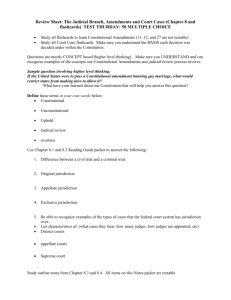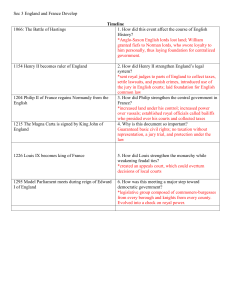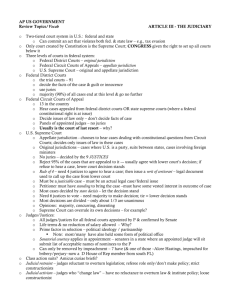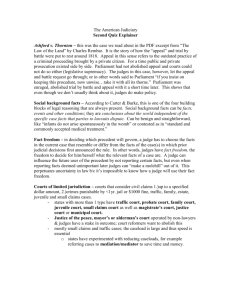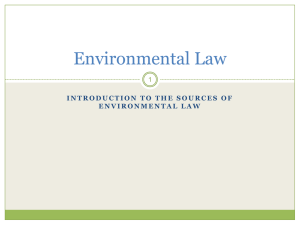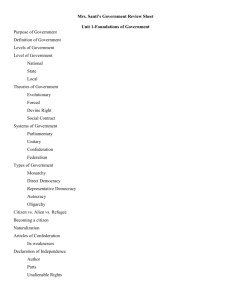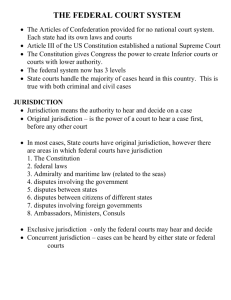Section 1: The sources of English law
advertisement
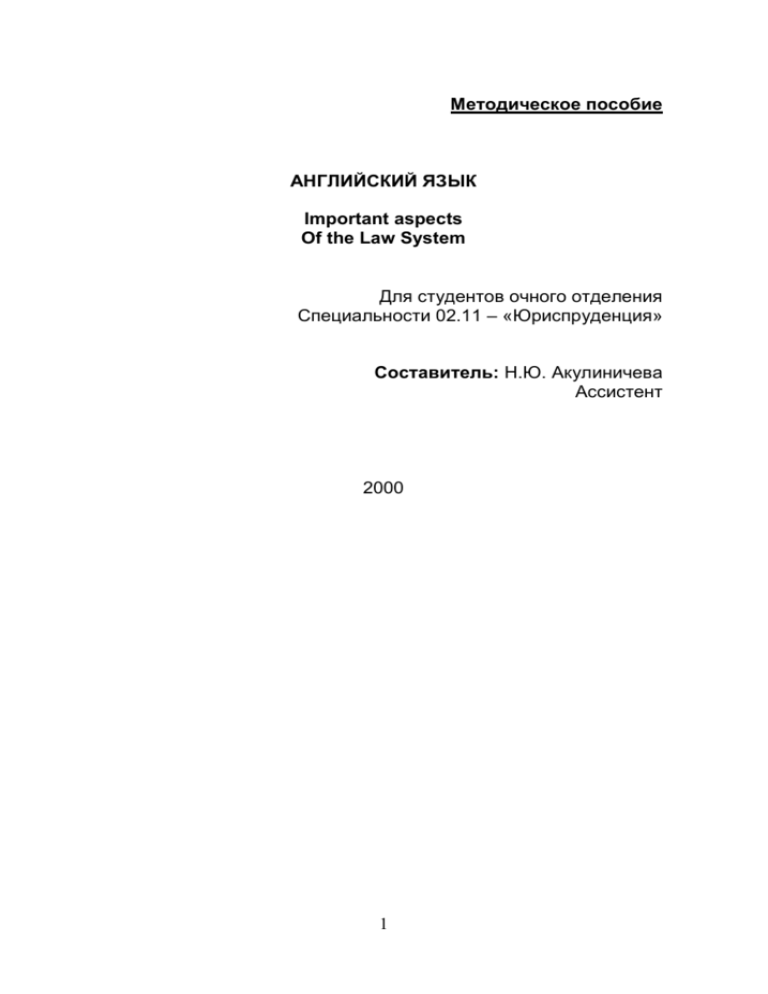
Методическое пособие АНГЛИЙСКИЙ ЯЗЫК Important aspects Of the Law System Для студентов очного отделения Специальности 02.11 – «Юриспруденция» Составитель: Н.Ю. Акулиничева Ассистент 2000 1 SECTION 1: THE SOURCES OF ENGLISH LAW .............................. 2 SECTION 2: GOVERNMENT IN THE UK TODAY............................ 6 SECTION 3: JUDICIAL ORGANIZATION IN THE UK. ................... 9 SECTION 4: HUMAN RIGHTS. ........................................................... 12 SECTION 5: READING NEWSPAPER CRIME REPORTS ............. 14 SECTION 6: INTERNATIONAL LAW. .............................................. 16 2 Section 1: The sources of English law Read and translate the text: The sources of English law. The courts are the interpreters and declarers of the law, the ‘sources’ of law therefore the sources to which the courts turn in order to determine what it is. Considered from the aspect of their sources, laws are traditionally divided into two main categories according to the solemnity of the form in which they are made. They may either be written or unwritten.These traditional terms are misleading, because the expression ‘written’ law signifies any law that is formally enacted, whether reduced to writing or not, and the expression ‘unwritten’ law signifies all unenacted law. For example, as will appear, judicial decisions are often reduced to writing in the form of law reports, but because they are not formal enactments they are ‘unwritten’ law. Since the fashion was set by the Code Napoleon many continental countries have codified much of their law, public and private; on the Continent, therefore, the volume of written law tends to preponderate over the volume of unwritten. But in England unwritten law is predominant, for more of our law derives from judicial precedents than from legislative enactment. Two principal subsidiary sources of English law must be mentioned. These principal sources are Legislation, and Judicial Precedent; the subsidiary sources are Custom and Books of Authority. Legislation is enacted law. In England the ultimate legislator is Parliament, for in our traditional constitutional theory Parliament is sovereign … here we are only concerned to explain the significance of the doctrine of ‘parliamentary sovereignty’. It means first, that all legislative power within the realm is vested in Parliament, or is derived from the authority of Parliament – Parliament thus has no rival within the legislative sphere – and it means secondly that there is no legal limit to the power of Parliament. Parliament may therefore, and constantly does, by Act delegate legislative powers to other bodies and even to individuals but it may also, by Act, remove these powers as simply as it has conferred them. In all countries, at all times, the decisions of courts are treated with respect, and they tend to be regarded as ‘precedents’ which subsequent courts will follow when they are called upon to determine issues of a similar kind. 3 So that although the approach to legal decision is on the one hand inductive at common law and on the other hand deductive in the civil law, in reality (apart from interpretive method) the two systems are not quite so divergent as might appear. One thing, however, which is distinctive of the English system is that because the English judge has, through precedent, power to make new law his position in the legal system is central. Another salient feature of the English system is the doctrine of the binding case. By this doctrine the authority of the courts is hierarchical; a court which is inferior in authority to another court is obliged to follow (‘bound by’) a court of superior authority if called upon to decide upon facts similar to facts already tried by the superior court. Further, even today case of ‘first impression’ sometimes arise; cases arising upon facts which bear no resemblance to the facts of any previous case. When the judge rules in such a case he legislates, because future courts must usually ‘follow’ him. A remark which leads to the comment that in ‘distinguishing’ between previous decisions and ‘following’ one rather than another the judge, though appearing only to apply existing law, in fact exercises a quasilegislative discretion: a fact which the system of ‘binding’ precedent serves to conceal. The administration of justice is not therefore a slot-machine process of matching precedents. The judges have a field of choice in making their decisions. But they do not exercise their discretion in an arbitrary way; they rest their judgments upon the general principles enshrined in case law as a whole. Case law does not consist of a blind series of decisions, ‘A will succeed’, or ‘B will fail’, but of reasoned judgments based upon rational principles. These principles have been evolved by the courts through the centuries: and, building precedent upon precedent, they have framed them with two ends in view. First, they have sought so to formulate them that their application may be capable of effecting substantial justice cases; second, they have sought to make them sufficiently general in scope to serve as guides to lawyers faced with the task of giving advice in future legal disputes. Thus in a sense the history of the common law (as opposed to statute law – for statutes are sometimes arbitrary and they have often brought injustice) is the story of the evolution of the judges’ conception of justice (a kind of natural law) realized in the form of rules of law intended to be general in their application and as easily ascertainable as possible. 4 Customs are social habits, patterns of behavior, which all societies seem to evolve without express formulation or conscious creation. Moreover custom is not solely important as a source of law, for even today some customary rules are observed in their own right and they command almost as much obedience as rules of law proper; they only differ from rules of law in that their observance is not enforced by the organs of the State. Thus, it will be seen … that many of the fundamental rules governing the Constitution are ‘conventional’ (i.e. customary), rather than legal, rules. On the other hand customs, prevailing among particular groups of people living in particular localities, are sometimes still recognized by the courts as capable of creating a special ‘law’ for the locality in question at variance with the general law of the land. But recognition of such variants upon the general law will only be accorded if certain conditions are satisfied. The following are among the more important of those conditions: - the custom sought to be established must ) not be unreasonable, (2) be ‘certain’, that is to say the right which is claimed must be asserted by or on behalf of a defined group of people, (3) must have existed since '‘time immemorial’. Literally this means that it must go back to 1189 (by historical accident the terminal date of ‘legal memory’)… Check that you understand the questions below. Answer the questions. a) b) c) d) e) What are the two main types of sources of law? Is most English law written in a code? Who makes legislation in England? Can the English courts influence the effect of legislation? Has English law developed (1) from fixed general rules? Or (2) through decisions in individual cases? f) Is the development of judicial precedent based on general principles of justice? g) Is custom important as a source of law (1) in the history of the law? (2) in England today? Find the correct answer: i) To decide a question of law, a practicing lawyer a) only refers to judicial precedent if the case concerns statute law b) refers to judicial precedent in all cases c) only refers to judicial precedent if the case does not concern statute law.` 5 ii) If the facts in a case are similar to two different precedents, the courts a) can choose which of the previous case to follow b) are not bound by the previous authorities c) can use their discretion to legislate and create a new precedent. iii) In the case-law system a) judges do not exercise discretion, they simply match precedents b) judges can reach any decision they consider right in cases where they have a choice c) judges follow general principles developed by the common law when they exercise their discretion. iv) In developing legal principles, the English courts have had two aims: a) (1) to give real justice in individual cases and (2) to form general principles for lawyers to use in the future so that the law is certain b) (1) to give a lot of justice in individual cases and (2) to help lawyers involved in future cases c) (1) to give justice in particular cases and (2) to form general rules which the courts can apply in future cases Check your knowledge Complete the following passage to check that you have understood the text so far and can use the new vocabulary. For each blank space choose the correct word the list below. Use each word once only. The importance of Legislation as a Source in English and Continental Law In many (1) continental countries much of the law is (2) ________. For this reason there is more written, or (3) _________ law than (4) ______ law. In contrast, there is no general code of (5) ___________ law. Still, (6) ________ is common, and many areas of law, e.g. (7) _________are codified, but (8) ________ is the main source of the law. Choose from: a) partnership b) enacted c) Continental d) unwritten e) English f) judicial precedent g) legislation h) codified 6 Section 2: Government in the UK today. State Organs The constitutional principles, rules and practices of the United Kingdom have never been codified; they derive from statute law, from common law, and from conventions of the constitution, which are not laws at all, but political practices which have become considered as indispensable to the smooth working of the machinery of government. The monarchy, followed by the legislative, executive and judicial organs of government will be discussed in turn. a. The monarchy is the most ancient secular institution in the United Kingdom, with a continuous history stretching back over a thousand years. The monarchy in the United Kingdom has evolved over the centuries from absolute personal authority to the present constitutional form by which the Queen reigns but does not rule. Her Majesty’s government governs in the name of the Queen who must act on the advice of her ministers. The Queen summons, prorogues (dismisses at the of a session) and dissolves Parliament; she usually opens new sessions of Parliament with a speech from the throne in which the major governmental policies are outlined. b. Legislature. – Parliament is the legislative organ and is constitutionally composed of the Monarch, the House of Lords, and the House of Commons. The Queen in Parliament represents the supreme authority within the United Kingdom. Parliament consists of two Houses: the House of Lords and the House of Commons. The House of Lords is for the most part still a hereditary body. It consists of the Lords Temporal and the Lord Spiritual. The Lords Temporal include hereditary peers and peeresses who have not disclaimed their peerages under the Peerages Act, 1963; life peers and peeresses created by the Crown under the Life Peerages Act, 1958 in recognition of public service; and Lords of Appeal in Ordinary. The House of Lords is presided over by the Lord Chancellor who is ex officio chairman of the House. The Lords Spiritual the Archbishops of Canterbury and York, the Bishops of London, Durham and Winchester, and the 21 most senior bishops of the Church of England. The House of Commons is an elected and representative body; members (at present 650) are elected by almost universal adult suffrage to represent constituencies in England, Scotland, Wales 7 and Northern Ireland. The law relating to Parliamentary elections is contained in substance in the Representation of the People Act, 1949, as amended. Any British subject aged 21 or over, not otherwise disqualified (as for example, members of the House of Lords, certain clergy, undischarged bankrupts, civil servants, holders of judicial office, members of the regular armed services and the police forces) may be elected a Member of Parliament (M.P.). Members are paid a salary and allowance for secretarial and office expenses; after a parliament is dissolved all seats are subject to a General Election. By-elections take place when a vacancy occurs during the life of a Parliament, as when a member dies, is elevated to the House of Lords or accepts an ‘office of profit’ under the Crown. The Speaker of the House of Commons is elected by the members from the members to preside over the House immediately after each new Parliament is formed. He is an impartial arbiter over parliamentary procedure and the traditional guardian of the rights and privileges of the House of Commons. c. Executive. – The government consists of the ministers appointed by the Crown on the recommendation of the Prime Minister, who is appointed directly by the Crown and is the leader of the political party which for the time being has a majority of seats in the House of Commons. The office of Prime Minister dates from the eighteenth century and is the subject of a number of constitutional conventions. The Prime Minister is the head of the government and presides over meetings of the Cabinet; by convention he is always a Member of the House of Commons. He consults and advises the Monarch on government business, supervises and to some extent coordinates the work of the various ministries and departments and is the principal spokesman for the government in the House of Commons. He also makes recommendations to the Monarch on many important public appointments, including the Lord Chief Justice, Lords of Appeal in Ordinary, and Lords Justices of Appeal. The Cabinet is the nucleus of government; its members consist of a small group of the most important ministers who are selected by the prime Minister. The size of the Cabinet is today about 23 and its principal function, much of the work being carried out in Committee, is to determine, control and integrate the policies of the government for submission to Parliament. The Cabinet meets in private and its deliberations are secret; no vote is taken, and, by the principle of 8 ‘Cabinet unanimity’, collective responsibility is assumed for all decisions taken. The central government ministries and departments give effect to government policies and have powers and duties conferred on them by legislation, and, sometimes, under the Royal Prerogative. Each is headed by a minister who is in most cases a member of either the House of Lords or the House of Commons. There are over 100 ministers of the Crown at the present time; they include departmental ministers. The United Kingdom has no Ministry of Justice. Responsibility for the administration of the judicial system in England and Wales is divided between the courts themselves, the Lord Chancellor, and the Home Secretary. The Lord Chancellor is concerned with the composition of the courts, with civil law, parts of criminal procedure and law reform in general; the Home Secretary is concerned with the prevention of criminal offences, the apprehension, trial and treatment of offenders, and with the prison service. Translation focus: national institutions Study the following words and phrases from the text, relating to UK institutions: Bill, the judiciary, Cabinet, MP, Lord Chancellor, constituency, byelection, Community law, Prime Minister, peer, Act of Parliament. Do similar institutions exist in your system with comparable characteristics and functions? Describing a system of government in your country Prepare to describe the system of government in your own country. Use the elements of the UK system of government as a guide and make brief notes if you like. Include the following points: THE HEAD OF STATE: appointment, functions and powers, relationship with other state organs THE LEGASLATURE: composition, functions and powers, relationship with other state organs THE EXECUTIVE: composition, functions and powers, relationship with other state organs. Using this box, match the letters on the left with the numbers on the right to form true statements about some of the Queen’s duties. 9 A Parliament is prorogued by the Queen B Parliament is summoned by the Queen C Parliament is dissolved by the Queen 1. before a new legislature can b 2. when the Prime Minister General Election 3. at the end of the year’s sessio Word study: a) What is the difference in meaning between the two verbs in the phrase ‘the Queen reigns but does not rule’ ? Why is the difference vital to the British constitution? b) What do you understand by advice ? Is the word normally used in exactly this sense? c) What do you suppose outlined means? d) Use the context to decide what a Bill is. e) What role does the monarch have in legislating? f) Remit means reduce. What do you think the prerogative of mercy is? Section 3: Judicial organization in the UK. Judicial organization. Superior courts. The highest court is the House of Lords, which exercises the judicial function of Parliament. In theory appeal to the House of Lords is an appeal to the whole House but in particularly since the Appellate Jurisdiction Act, 1876, created a group of salaried life peers, the Lords of Appeal in Ordinary, or ‘law lords’, there is an established convention dating from1844 that lay peers do not participate in judicial sittings of the House. Appeals are referred to an Appellate Committee of the House. By that Act an appeal must be heard by at least three of the Lord Chancellor, the Lords of Appeal in Ordinary, and such peers as hold or have held high judicial office. The House has almost entirely appellate jurisdiction only, in civil and criminal cases from the Courts of Appeal in England and Northern Ireland and in civil cases only from Court of Session in Scotland. The court of Appeal sits in both civil and criminal divisions. The Civil division hears appeals from the High Court, country courts, the Restrictive Practices court, certain special courts, and certain tribunals, such as the Lands Tribunal. The Criminal division hears appeals by persons convicted on indictment in the Crown Courts. The High Court in its civil jurisdiction is divided into three Divisions (Queen’s Bench, Chancery, and Family (formerly Probate, Divorce and Admiralty)) to each of which certain kinds of cases are assigned. Divisional courts of each of the divisions, consisting of two 10 or more judges, have limited appellate jurisdiction in certain cases. The main civil jurisdiction is exercised by single judges hearing cases of the kind appropriate to the divisions to which the judges belong. The criminal jurisdiction of the High Courts is exercised exclusively by Queen’s Bench Division. A divisional court of two or three judges of that Division deals with appeals from a Crown Court and magistrates’ courts, and also exercises the supervisory jurisdiction of the court, issuing the prerogative writ of habeas corpus and to ensure that magistrates’ courts and inferior tribunals exercise their power properly, by granting orders of mandamus, prohibition and certiorari. The Crown Court, created in 1972, replaces the former assizes and quarter sessions. It exercises criminal jurisdiction and sittings are held regularly at major towns throughout England and Wales. It comprises judges of the Queen’ Bench Division of the High Court, circuit judges and Recorders (part-time judges). They sit singly with juries trying persons charged on indictment with crimes. A judge of the Crown Court sits with two to four justices of the peace to hear appeals from magistrates’ courts and proceedings on committal by magistrates to the Crown court for sentence. The Central Criminal Court, known as the Old Bailey, is a sitting of the Crown Court, having criminal jurisdiction only, over indictable offences committed in Greater London or on the high seas. The court consists of ex officio judges and in practice consists of judges of the Queen’s Bench Division, the Recorder of London, the Common Serjeant, and certain additional judges of the Central Criminal Court. Inferior courts. County courts have exclusively civil jurisdiction, which is limited in extent and in area, and which is entirely statutory. The judges are persons who also hold office as Circuit judges of the Crown Court. Magistrates’ courts consist of a stipendiary magistrate or of from two to seven (usually two or three) lay justices of the peace; a single lay justice has a very limited jurisdiction. Magistrates’ courts have civil jurisdiction in relation to certain debts, licenses, and domestic proceedings. In the exercise of criminal jurisdiction one or more justices may sit as examining magistrates to conduct a preliminary investigation into an indictable offence. A magistrates’ court may try summarily many minor statutory offences, and also certain offences if the prosecutor applies for the case to be 11 head summarily, the court agrees it is a suitable mode of trial and the defendant does not elect jury trail. Cases may be appealed to the Crown Court or defendants remitted for sentence to the Crown Court. Answer these questions: a) b) c) d) e) f) g) h) What are the two main areas of jurisdiction of English courts? Which courts exercise jurisdiction in both areas? Which are the superior courts in England and Wales? Which is the final court of appeal? Which Division of the High Court has criminal jurisdiction? What is the maximum number of appeals in a civil case? And in a criminal case? Do the country courts hear all civil cases? Decide if the following statements are true or false: a) When the House of Lords sits as a court (not a legislative body) only peers who are senior members of the judiciary can take part in the proceedings. b) The House of Lords is the final court of appeal for civil and criminal cases in the UK. c) The three Divisions of the High Court each hear different kinds of cases. d) The Queen’s Bench Division of the High Court is responsible for judicial review of administrative action. e) A jury is always present at Crown Court hearings. f) The Old Bailey is the name of the Crown Court for the London area. g) The courts only hear cases concerning statute law. i) All English judges and magistrates are professional lawyers. j) The magistrates’ courts investigate some cases, which are later tried by jury the Crown Court. k) The magistrates’ courts can choose to hear cases with or without a jury. Section 4: Human Rights. Tyrer Case 1. In the Tyrer case, The European Court of Human Rights sitting, in accordance with Article 43 of the Convention for the Protection of Human rights and Fundamental Freedoms (hereinafter referred to as ‘the Convention’) and Rule 21 of the Rules of Court delivers the following judgment, which was adopted on the last-mentioned date: 12 PROCEDURE The Tyrer case was referred to the Court by the European Commission of Human Right (hereinafter referred to as ‘the Commission’). The case originated in an application against the United Kingdom of Great Britain and Northern Ireland lodged with the Commission on 21 September 1972. 2. Mr. Anthony M. Tyrer, a citizen of the United Kingdom born on 21 September 1956, is resident in Castletown, Isle of Man. On 7 March 1972, being then aged 15 and of previous good character, he pleaded guilty before the local juvenile court to unlawful occasioning actual bodily harm to a senior pupil at his school. The assault, committed by the applicant in company with three other boys, was apparently motivated by the fact that the victim had reported the boys for taking beer into the school, as a result of which they had been caned. The applicant was sentenced on the same day to strokes of the birch in accordance with the relevant legislation. He appealed against sentence to the Staff of Government Division of the High Court of Justice of the Isle of Man. The appeal was heard and dismissed on the afternoon of 28 April 1972; the court considered that an unprovoked assault occasioning actual bodily harm was always very serious and that there were no reasons for interfering with the sentence. The court had ordered the applicant to be medically examined in the morning of the same day and before it a doctor’s report that the applicant was fit to receive punishment. After waiting in a police station for a considerable time for a doctor to arrive, Mr. Tyrer was birched late in the afternoon of the same day. His father and a doctor were present. The applicant was made to take down his trousers and underpants and bend over a table; he was held by two policemen whilst a third administered the punishment, pieces of the birch breaking at the first stroke. The applicant’s father lost his self-control and after the third stroke ‘went for’ one of the policemen and had to be restrained. The birching raised, but did not cut the applicant’s skin and he was sore for about a week and a half afterwards. 3. The applicant was sentenced pursuant to section 56 whereby: ‘Any person who shall – (a) unlawfully assault or beat any other person; (b) make use of provoking language or behavior tending to a breach of the peace, shall be liable on summary conviction to a fine not exceeding thirty pounds or to be imprisoned for a term not exceeding six months 13 and, in addition to, or instead of, either such punishment, if the offender is a male child or male young person, to be whipped.’ The expressions ‘child’ and ‘young person’ mean, respectively, an individual of or over the age 10 and under 14 and an individual of or over the age of 14 and under 17. Execution of the sentence was governed by the following provisions: ‘(a) the instrument used shall, in the case of a child, be a cane, and in any other case shall be a birch rod; (c) the court in its sentence shall specify the number of strokes to be inflicted, being in the case of a child not more than six strokes, and in the case of any other person not more than twelve strokes; (d) the whipping shall be inflicted privately as soon as practicable after sentence and in any event shall not take place after the expiration of six months from the passing of the sentence; (e) the whipping shall be inflicted by a constable in the presence of an inspector or other officer of police of higher rank than a constable, and, in the of a case child or young person, also in the presence if he desires to be present, of the parent or guardian of the child or young person.’ Check that you now have the following information about the text: a) b) c) d) e) f) The court: The date: The origin of the case: The parties to the case: The main issue: The main subject of paragraph 1: paragraph 2: paragraph 3: Make a summary of the text. Talking points: Think about the following points for a few moments: Which forms of punishment do you think are effective deterrents? Which punishments can help to rehabilitate the offender? What do you think are the main aims of the penal system in your country? Do you agree with them? 14 Section 5: Reading Newspaper Crime Reports Quickly find the heading below which matches each of the five newspaper articles: 1) Home to prison 2) Murder charges 3) Escape charge 4) Heysel case 5) Policeman convicted of punching hippy 1 Three men appeared before magistrates in Hertford accused of murdering PC Frank Mason, who died during an armed hold-up at bank in Hemel Hempstead. Charles McGhee, 30, of Luton, Perry Wharrie, 28, of Lee, south London, and James Hurley, 26, of Luton, and a fourth man, Robert McFarland, of Luton, accused of disposing of property to impede the arrest of the three, were all remanded in custody for three days. 2 A man appeared in Marylebone magistrates court in London yesterday, accused of escaping police custody at a hospital 13 months ago. Alan Knowlden, 36, was also charged with conspiring to commit armed robbery. He was remanded in custody to appear at Lambeth Magistrates Court next Friday. 3 BRUSSEL – A convention signed here yesterday should mean that the 26 Britons wanted in Belgum in connection with the 1985 Heysel football riot would be allowed to serve jail sentences in Britain if they are convicted here, David Usborne writes. The accord, signed by 10 states, including Britain and Belgium, guarantees that people convicted in an EC state other than their own will have the right to serve the sentence in their home country. The Belgian Justice Minister, Jean Gol, confirmed that the convention would apply to the wanted Britons if they are finally tried. “There would be no problem if these people wanted to do their term in UK”, he said. A similar convention on the transfer of convicts already exists in the 21-member Council of Europe, but has never been ratified by Belgium. Belgian efforts to extradite the 26 Britons suffered a serious setback three months ago when the case failed in the High Court because of a legal technicality. Proceedings have now been resumed. 15 4 The trail in Belgium of 26 British football fans on charges arising out of the 1985 Heysel Stadium disaster will open in Brussels today, and be adjourned until the autumn. Belgian defense lawyers will appeal for a suspension because they have not had sufficient access to evidence. 5 STEPHEN Syratt, a Wiltshire police sergeant, was found guilty yesterday in Winchester Crown Court of causing actual bodily harm to a member of the 1985 Stonehenge hippy peace convoy. He was sentenced to three months’ imprisonment, suspended for 12 months. The court was told that Syratt, aged 34, of Swindon, who had served for 17 years, had punched a prisoner at Amesbury police station. He would almost certainly be dismissed from his pension rights, Mr Justice Swinton Thomas said. Read the following texts: Jack Thatcher. Like his father, Jack Thatcher is a jailbird – at the age of 40 he has spent most of his life in prison for various offences of violence and theft. He comes from a broken home, has had no real education and has never had a job. The only way he knows how to make money is by stealing it. When he came out of prison last week, he decided to rob a village office. During the robbery, the postmaster tried to ring the alarm, so Jack hit him on the head with his gun. At that moment a customer came into the head with his gun. At that moment a customer came into the post office. She screamed. In panic, Jack shouted at her to keep quiet. When she continued to scream, he shot her. Jack thought quickly. He took a box of matches from his pocket and set fire to the building, then escaped with the money. Annette Forbes. Annette Forbes is head of the marketing division of GMC, the computer company. She went to university, has a good job and enjoys a happy family life. She has always been a ‘law-abiding citizen’. One day she arrived a little late for work, and to park her car in a no parking zone. She took a client out for a business lunch and drank a gin and tonic, half a bottle of wine and a liqueur to celebrate an important new contract. When driving back to work, she was stopped by a policeman, who tested breath for alcohol. He told her she had drunk too much and would be disqualified from driving for a 16 year. Annette (who needs car for her job) suggested he might ‘forget’ about the offence in return for a brand new GMC home computer. That afternoon, Annette remembered that she had no more writing-paper at home. As usual, she took a new packet of paper from the office and a box of six pencils. Answer the questions: If they are charged and convicted of all their offences, what sentences do you think Jack and Annette will receive? In your opinion, what is the most suitable punishment for Jack and Annette? Do you think they will commit other offences in future? Discuss the cases with other members of the class. Section 6: International LAW. Read and translate the text: Legal aspect of the Rainbow Warrior affair Outline of the Facts Two DGSE agents using false names were arrested in New Zealand on 12 July 1985 and duly charged with passport and related offences. On 23 July they were further charged with conspiracy to commit arson, with willfully damaging the Rainbow Warrior by means of explosives, and with the murder of Fernando Pereira, a crewmember who drowned in the incident. They pleaded not guilty and were remanded in custody. In mid-August the French press identified them as Alain Mafart and Dominique Prieur. On 26 July New Zealand police also obtained warrants to arrest agents who had left New Zealand prior to the explosions. On 13 August New Zealand demanded extradition of all those involved, but the French government replied that it could not extradite French nationals. The other agents, including three who reported to the Paris police on 25 August, were never apprehended. The charges against Mafart and Prieur were altered to manslaughter and wilful damage at the hearing on 4 November 1985. The agents pleaded guilty and were sentenced on 22 November to ten years’ imprisonment for manslaughter and seven years’ for wilful damage, the terms to run concurrently. The French Defence Minister told them that government would work for their release and on 28 November he urged negotiations for their return to France. An investigation by French government into possibility of involvement, published on 26 August 1985, recognised the identity 17 and affiliation of the agents but found no evidence to indicate that their mission involved anything other than surveillance. On 6 September France notified New Zealand of its concern that Mafart and Prieur should enjoy all the guarantees of international law. After further press revelations France acknowledged on 22 September that the agents had obeyed orders, and protested that they should be exempted from blame. Meanwhile New Zealand had notified France on 6 September that it would take legal steps to secure compensation from the French State. Further, the New Zealand Prime Minister, David Lange, said on 26 September that he had prohibited extradition of the agents and political interference in the legal proceedings. After the convictions he remarked on 16 December that New Zealand would consider repatriating the agents provided they continue to serve their prison sentences. Negotiations between New Zealand and France, which had begun on 23 September 1985, continued intermittently until 19 May 1986 when New Zealand suspended them in protest at continued economic sanctions by France. Early in 1986 France began impeding New Zealand imports. New Zealand formally complained to France on 26 February 1986, and on 4 April the European Community Trade Commissioner upheld the complaint. France did not admit to imposing the trade barriers until 22 April. Other European States were concerned to see the dispute resolved, but efforts at mediation were hardly possible until the facts had been ascertained and the New Zealand proceedings completed. On 12 September 1985 the European Parliament condemned secret service activity against the Rainbow Warrior and demanded a full explanation from France. The UK government took little part in the dispute but on 24 September 1985 called on France to settle compensation without delay. During a visit to Europe in June 1986 Lange indicated that various governments had impressed upon him the need for an early resolution of the dispute. Between 31 May and 2 June, Ruud Lubbers, President of the European Council of Ministers and Prime Minister of the Netherlands, explored with the parties a proposal for independent arbitration. France and New Zealand announced on 19 June that they agreed to refer all matters without precondition to arbitration by the UN Secretary-General. The ruling was completed on 6 July 1986 and signed on 9 July. It required France to apologise and pay a fixed sum to New Zealand; required New Zealand to transfer Mafart and 18 Preiur into French custody; and enjoined France not to impede New Zealand exports to the European Community. The terms were carried out on 22-23 July 1986, and France subsequently abided by the ruling on New Zealand exports. France reached a settlement with the family of Fernando Pereira on 12 November 1985, encompassing a formal apology, compensation totalling 2.3 million francs, and reimbursement of the insurers. France and Greenpeace agreed on 19 December 1985 to negotiate damages – France having admitted legal liability on 10 December. Unable to reach agreement, they referred the matter to a panel of three arbitrators on 10 July 1986. A ruling was still awaited in May 1987. Make a summary of the text. Use your summary of the text to check the facts given in the passage below. Twelve of the facts stated are wrong – can you find the mistakes? You may need to refer to the text for some of the answers – this will depend on the information you chose to include in your summary. The rainbow Warrior Affair: Summary of the Facts A The main events July 1985: August’85: September’85: November’85: French secret service agents Mafart and Prieur charged in New Zealand with passport offences, conspiracy to commit arson, wilful damage and manslaughter in connection with Rainbow Warrior attack. Pleaded not guilty, remanded in custody. French Government agreed to extradite all other agents involved in attack. France admitted responsibility for ordering attack. Claimed Mafart and Prieur should therefore not be held liable. Mafart and Prieur tried for arson, murder and wilful damage. Pleaded not guilty, convicted, sentenced to life imprisonment. French Defence Minister wished to negotiate their return to France. 19 B Negotiations between France and New Zealand September’85: Negotiations began. New Zealand would take proceedings against Mafart and Prieur for compensation. Insisted on no political interference and refused to exradite agents. In December New Zealand agreed to consider repatriation of agents on condition they served rest of prison sentence in France. Early’86: France began economic sanctions against New Zealand. New Zealand complaint against sanctions Accepted by European Community Commission. France did not admit sanctions. C Resolution of dispute between France and New Zealand September’85: European governments wished to see dispute settled quickly. Attack condemned by European Parliament. UK Government took action to settle dispute. June-Jule’86: Dispute referred to UN Secretary-General for arbitration. Ruling: France: apologise, compensate New Zealand, Remove economic sanctions. New Zealand: apologise, transfer Mafart and Prieur to French custody. D Settlement of disputes between France and victims November’85: France to family of deal man: apology, compensation. December’85: France to Greenpeace: admitted liability, paid damages. Complete each of the sentences below: a) Judicial corporal punishment was ________ in England in 1948. (1) abolished (2) endorsed (3) repealed (4) ratified b) The parties continued ________ for several months before a/an _______ to the dispute was finally reached. [Choose two different words.] (1) arbitration (2) negotiations (3) settlement (4) reparation 20 c) The defendant’s husband was killed in the accident she had caused. It was found that she was guilty of gross negligence, but had not intended to kill the victim. As a result she was convicted of _______ . (1) killing (2) murder (3) manslaughter (4) assault d) The Crown Court sentenced him to _______ for committing assault occasioning grievous bodily harm. (1) a suspended sentence (2) a 2-year probation order (3) judicial corporal punishment (4) 5 years’ imprisonment e) The applicant’s punishment was degrading in the circumstances, _________ Article 3 of the European Convention on Human Rights. (1) consequently it was in accordance with (2) accordingly it was contrary to (3) nevertheless it constituted a breach of (4) moreover it was consistent with f) The UK Government refused to _________ the accused on the grounds that she was a political offender. (1) convict (2) charge (3) remand (4) extradite g) A State may have to make reparations to victims for ________ of its agents abroad. (1) infringements (2) damage caused by criminal acts (3) espionage (4) prosecutions h) There can be no ________ some of the rights protected by the European Convention of Human Rights. (1) derogation form (2) immunity form (3) provision for (4) repeal of 21


